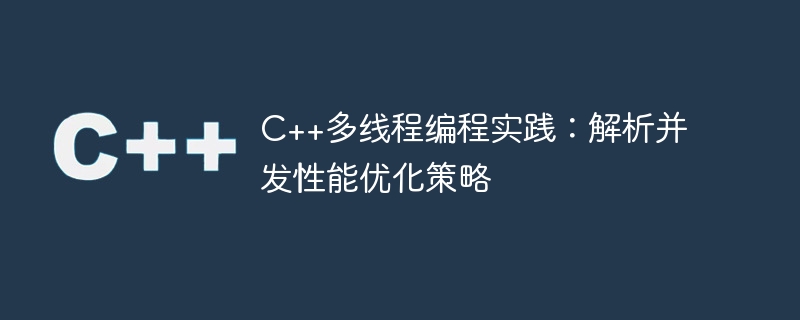

In today's computer field, multi-threaded programming has become an essential skill for many software developers. Whether it is developing a high-performance game engine or designing a highly concurrent network server, multi-threaded programming can help us make full use of the computer's multi-core processing capabilities to achieve better performance and response speed. However, multi-threaded programming also brings some complex problems, such as race conditions, deadlocks, etc., so it is necessary to design optimization strategies for concurrent performance based on these problems.
1. Reasonable use of lock mechanism
In multi-thread programming, locks are an important means of controlling concurrent access to shared resources. However, excessive use of locking mechanisms may result in reduced system performance. Therefore, we need to choose and use locks reasonably.
First of all, you need to choose different lock types according to the actual situation. In scenarios with low read and write concurrency, you can choose Read-Write Lock to improve the concurrency performance of read operations. In scenarios with frequent write operations, you can consider using a mutex (Mutex) to protect the integrity of shared resources.
Secondly, pay attention to the granularity of the lock. Too fine granularity of locks may lead to frequent context switching and reduce system performance. If the lock granularity is too coarse, the concurrency performance cannot be fully utilized. Therefore, careful evaluation and adjustment are required based on actual scenarios.
In addition, you can also consider using lock-free data structures to replace locks. Lock-free data structures use atomic operations to ensure data consistency and avoid the performance overhead caused by locks. However, it should be noted that the implementation of lock-free data structures is more complicated, and the consistency and correctness of concurrent access need to be carefully considered.
2. Task division and scheduling
In multi-thread programming, reasonable division and scheduling of tasks are the key to improving concurrency performance. On the one hand, tasks need to be divided into subtasks that can be executed in parallel and assigned to different threads for execution. On the other hand, threads must be scheduled reasonably to make full use of the computer's multi-core processing capabilities.
The principle of task division is to split tasks into independent subtasks as much as possible. This maximizes parallelism and reduces dependencies and conflicts between threads. At the same time, it is also necessary to consider the balance of task division to avoid overloading certain threads, resulting in a decrease in system performance.
The principle of task scheduling is to try to distribute tasks on different cores for execution. Task scheduling frameworks, such as OpenMP, TBB, etc., can be used to automatically assign tasks to different threads or cores. In addition, you can also manually adjust the priority of threads, bind CPU cores, etc. according to the actual situation.
3. Data sharing and communication
In multi-threaded programming, data sharing and communication between threads are very important. Reasonable data sharing and communication strategies can improve concurrency performance and reduce competition and conflicts between threads.
First of all, you need to choose a reasonable way to share data. Thread-Local Storage can be used to ensure that each thread has an independent copy of data to avoid race conditions. Or you can choose to use atomic operations to ensure data consistency and avoid the use of locks.
Secondly, it is necessary to choose the method of data communication reasonably. Message queues, events and other mechanisms can be used to achieve communication between threads. In addition, mechanisms such as lock-free queues and lock-free buffers can be used to reduce competition and conflicts between threads.
4. Performance analysis and optimization
In actual multi-thread programming, it is very important to analyze and optimize system performance in a timely manner. Performance analysis tools such as flame graphs, performance counters, etc. can be used to help locate performance bottlenecks and hot code. Then, based on the results of the performance analysis, corresponding optimization strategies are designed and implemented.
Common performance optimization strategies include reducing lock usage, reducing context switching, reducing memory allocation and release, etc. Lock usage can be reduced by merging locks, using lock-free data structures, using thread pools, etc. Context switches can be reduced by properly setting thread priorities and scheduling policies. Memory allocation and release can be reduced by using object pools, memory pools, etc.
Summary:
To sum up, in the practice of multi-threaded programming, we need to have an in-depth understanding of the strategies and techniques of concurrent performance optimization. Reasonable use of lock mechanisms, reasonable division and scheduling of tasks, reasonable selection of data sharing and communication methods, and timely performance analysis and optimization are all keys to improving concurrency performance. Through continuous practice and experience summarization, we can write high-performance, high-concurrency multi-threaded programs.
The above is the detailed content of C++ multi-threaded programming practice: analyzing concurrency performance optimization strategies. For more information, please follow other related articles on the PHP Chinese website!
 What are the differences between c++ and c language
What are the differences between c++ and c language
 Recommended learning order for c++ and python
Recommended learning order for c++ and python
 Cost-effectiveness analysis of learning python and c++
Cost-effectiveness analysis of learning python and c++
 Is c language the same as c++?
Is c language the same as c++?
 Which is better to learn first, c language or c++?
Which is better to learn first, c language or c++?
 The difference and connection between c language and c++
The difference and connection between c language and c++
 C++ software Chinese change tutorial
C++ software Chinese change tutorial
 Cost-effectiveness analysis of learning python, java and c++
Cost-effectiveness analysis of learning python, java and c++




